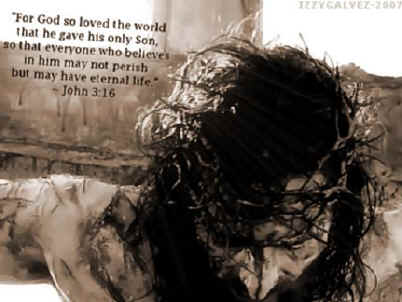The Fourth Word
My God, My God, Why Have You Forsaken Me? | Andrea McNally

"From noon on, darkness came over the whole land until three in the afternoon. And about three o’clock Jesus cried with a loud voice, “Eli, Eli,
lema sabachthani?” that is “My God, my God, why have you forsaken me?” Matthew 27:45-46.
Mark 15:34 repeats the same words. For both Matthew and Mark, these are Jesus’ LAST words from the cross adding to their significance.
For modern Christians, these may be the most challenging of Christ’s last words, primarily because, on some level, we really don’t want to believe them. Who wants to hear that Jesus himself, at his most desperate hour, in mortal pain, barely able to breathe, used his last strength to reveal that he had been abandoned and deserted by God his father? If this horror show was all part of God’s plan, why would He leave his own son hanging on a cross, uncomforted and totally alone, at the very moment he had most need of his father’s presence?
I used to think that this outburst was Jesus’ humanity expressing itself in his last moments. He is perfect man as well as perfect God, and so he might naturally express a human terror and fear at the end of his life. Not a very satisfactory answer but it has a certain logic.
The most common explanation for these words, one I had read and that was suggested by friends, is that Jesus is quoting Psalm 22. “My God, my God, why have you forsaken me?” is literally the first line of this psalm. We know Jesus knew scripture well. As an devout Jew, he would not only have prayed the
Psalms but memorized them. And this psalm is eerily prescient. I won’t
[quote] the whole thing, but verse 16 says “They pierced my hands and my feet” and verse 18 adds “They part my garments among them and cast lots upon my vesture.” The parallels with Christ’s crucifixion are glaringly obvious. Maybe Jesus just wants to be sure that we get the connection, further proof that he is who he says he is. If his crucifixion had been described in detail in a
psalm written a millennium earlier, surely there can be no doubt that he is the son of God and that this is all part of God’s plan.
And there is further comfort in this explanation. Maybe Jesus is reciting the whole psalm to himself. Although opening in despair, it goes on to affirm God’s power and presence in the psalmist’s life. He says, “Our fathers trusted in thee: they trusted, and thou didst deliver them.
They cried unto thee, and were delivered: they trusted in thee, and were not confounded.” Later he adds, “For he hath not despised nor abhorred the affliction of the afflicted; neither hath he hid his face from him; but when he cried unto him, he heard.” David, the psalmist, and through him, Jesus, seems to reaffirm his total trust in the Lord. Jesus doesn’t REALLY feel abandoned. He’s just reciting scripture. Problem solved.
Not really. I can’t quite believe that Jesus in extremis is using his last breath to point out relevant Bible passages. The disciples would have realized the importance of this psalm soon enough. And Jesus only cried out loud the first line of the psalm; he never got to the more comforting words. Something else is going on here. The Anglican cleric, R.T. France says, “The words Jesus chose to utter are those of unqualified desolation, and Matthew and Mark give no hint that he did not mean exactly what he said.” Ouch.
Let me digress for a moment. I took a course at Florida Atlantic University years ago for required credits to renew my teaching certificate. I probably chose it because it fit my schedule, not because I was particularly interested in the subject. Called
Mysticism in Literature, it covered, among other things, ancient Sufi legends, American Indian lore, and modern stories from
The Wizard of Oz to Star Wars. The professor gradually built up the similarities in these disparate works, pointing out how the hero of each undertakes a journey, how he is totally cut off from all support and plunged into despair at his failure, how at his lowest moment he recognizes or learns a new truth, and how he then returns to share this enlightenment with those who need to hear it. [It was more complicated than that, but that’s the basic idea.] I later identified the pattern in
Sir Gawain and the Green Knight and used it to explicate The Rime of the Ancient
Mariner for my seniors. It was a useful tool for literary analysis. While writing the final exam for the course, a three-bluebook marathon, I dared to write ‘even Christ on the cross experienced total despair as shown in his words, “My God, my God, why hast thou forsaken me?’ At the moment I wrote it, I was thinking this is pure, unadulterated heresy, but, anything for a good grade. The professor was impressed. He put one of his coveted red check marks next to the line. I’d used an example he hadn’t given in class. I got my good grade but continued to feel vaguely guilty. Could Christ have despaired? This was blasphemy, wasn’t it?
Maybe not.
In the years since, I’ve thought about that exam paper, and when Deacon Bob asked me to do this meditation, it immediately came to mind. The questions persist. Did God forsake Jesus on the cross? Did Jesus believe he had been forsaken? Was this abandonment a necessary part of the plan? In
EFM* we had read a book about the Atonement, but I couldn’t remember anything relevant, and I’d given away the book. I did some research [actually, I Googled it] and did find a couple of answers that make sense to me.
In the first, Larry White, a Baptist minister from Arkansas, states the case as clearly as anyone. He writes,
“When Jesus hangs on the cross, despised, suffering, and dying, he has upon himself the entirety of all sin. God cannot look upon sin, so he turns his back and withdraws his favor. The burden is now fully upon his Son and the reality of God’s wrath for sin reveals itself in full. Here is where Jesus cries out “My God, my God, why have you forsaken me?” In this moment there is the despair of death, but in the words of the
psalm that he references, there is also hope for deliverance. Jesus still has trust in the God of the Universe. He has submitted to God’s will to that very last moment. There is a terrible beauty in this death in that it shows us that God loves us by taking our place on the cross and dying in our stead.”
I think the important point here is that Christ on the cross has assumed ALL of the world’s sin, past, present, and future. Sin has been defined as that which separates us from God, and so God himself cannot or will not look upon it. But if Jesus is to atone for all our sin, he must assume that sin and so he must do it alone. He does it willingly, yet he feels God’s abandonment.
Another writer, Whitney Woollard, a woman from Portland, Oregon, says it this way. “This Scripture expresses the depth and horror of what Jesus was suffering. In that moment, Jesus was plunged into outer darkness away from the Father’s presence to bear the sins of the world.” She also quotes R.T. France who
says, "'In giving his life as a ransom for many for the forgiveness of sins he must, for the moment, be separated from his
Father.'" Wollard continues, "Having experienced unbroken communion with the Father from eternity past, Jesus felt the full weight of separation from God that our sin demanded and for the first time he was truly alone, utterly
God-forsaken."
Wollard continues, “As we digest this difficult truth, remember this was not divine child abuse. . . . The Father and the Son willingly chose to carry out this plan of redemption and both the Father and the Son were in agony during
Jesus' crucifixion. To obtain our salvation the Father painstakingly separated himself from the Son but only
temporarily."
Both quotations emphasize that it is sin that separates Jesus from God but the sin is OUR sin. This separation is what makes the Atonement possible.
Is this a satisfactory explanation for Jesus’ heart-wrenching cry? It certainly doesn’t make anyone feel better about it. But I don’t think we are meant to feel better or to explain it away. We are perhaps meant to feel it in all of its horror, to participate in the desperate moment, and to come to a greater understanding of our true debt to Christ Jesus. He bore the pain and separation for us. Remember, the final leg of the journey of the mystical hero is a return to share his moment of enlightenment with those who need to hear it. Jesus accomplished this return in spectacular fashion. He rose on Easter morning and we for whom he died share also in that resurrection.
Copyright 2024 Andrea McNally
*Education for Ministry is a four year course for lay people in the
Episcopal church.
Subscribe to our Newsletter - Learn More
You can make a
difference!
Your donation
to the site helps us distribute our
children's ministry resources to churches across the world.
Return to the Adult and Teen Devotionals page.
